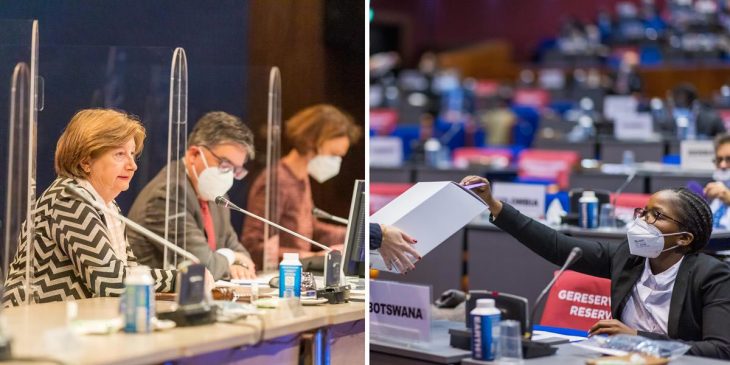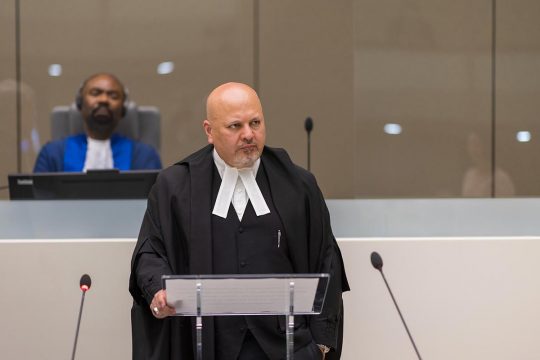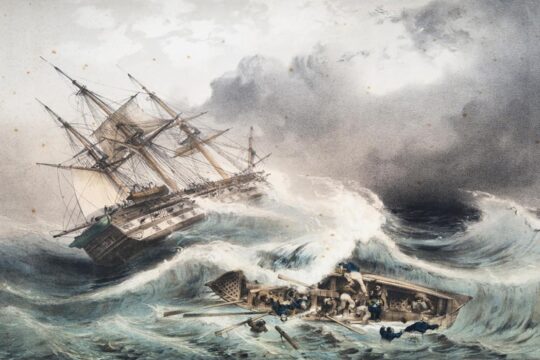The atmosphere during the week-long meeting in the cavern-like setting of the World Forum in the Hague was both upbeat and workmanlike. A new court president, a new chair of the States’ meeting and a new prosecutor were all on the top table at the opening session of the Assembly of States Parties (ASP) of the International Criminal Court (ICC). U.S. Sanctions levied over a year ago against the former prosecutor Fatou Bensouda for her attempt to investigate alleged United States war crimes in Afghanistan are not only in the past but had also forced many states to proclaim their allegiance to international criminal justice and support for the court’s work. Meanwhile, heavy Covid-19 restrictions meant only a limited number of NGOs monitoring states at this annual jamboree. Candidates for a variety of elections, including positions on the board of the Trust Fund for Victims and for new deputy prosecutors, meanwhile lobbied states delegates in corners, side events were held online, and controversies kept to a minimum.
State members of the ICC looked at the court’s request for a 9.5% increase in its annual budget and agreed to less than half the additions, making it only a modest rise to nearly 155 million Euro. “It is notable that it is an increase,” says Elizabeth Evenson who monitored proceedings for international NGO Human Rights Watch (HRW), but “it’s concerning, it's less than what the Committee on Budget and Finance (CBF) recommended”. And the decision comes against the backdrop of pleas from all the court’s principals that more cash is needed because of an increase in workloads across the institution, with a doubling of trials predicted for 2022, and a number of changes in the Office of the Prosecutor.
The reality check though – as the CBF pointed out – is that as of the middle of 2021, the court was owed more than 60 million Euros in back payments from state members and “until States in arrears demonstrate a willingness to substantially reduce outstanding contributions, budgetary increases will be restricted to what is essential only and, in the first instance, internal savings, efficiencies and prioritisation will be used to meet those essential requirements.”. The considerable size of the accumulated arrears are mainly explained by the economic effects of coronavirus says Alexandrah Bakker, who runs the Lawyering Justice blog for Public International Law & Policy Group (PILPG), a global pro bono law firm, meaning that there’s “no easy solution [to the budget crunch]; states are struggling so the court is struggling”.
No ghosts no deceit
The new prosecutor Karim Khan had asked states for enough money to flesh out the substantial changes he is making in how his office should investigate and prosecute some of the most serious crimes in the world. At a press conference he justified decisions he’s made – for example, to deprioritise the US and Afghan part of a broad investigation into crimes committed there since 2003 – as a result of resource choices, not “timidity” in challenging a superpower. “Ultimately,” he said his office “has spread itself too thin” over 11 investigations and 16 preliminary examinations; “there's a degree of realism everybody needs to get”.
As part of that approach, he pledged no “ghost teams”, without going into details. He indicated that some investigations he inherited are less substantial than he might have expected, as he is conducting his review of all the investigations and preliminary examinations. He said he would not “proceed and give an impression that there is activity [in his office] when there is not, because I think that is not honourable.”
“If we keep promising that we can do everything when we've got these resources,” he continued, “we're lying, we're deceitful. We're raising expectations and I'm not going to whatever the consequences.”
The detail of his decisions to proceed or not with crimes that met the gravity threshold would be backed up by written assessments from his teams assessing the likelihood of successful prosecution. “Is there evidence to give rise to a realistic prospect of conviction?” would be the “yardstick” for action, he said. Cases and the evidence supporting them don’t get stronger while the ICC waits to issue an arrest warrant: “The high watermark may well be before somebody is named and you have to make a call then, if the evidence is capable of proving the case beyond reasonable doubt.”
Pragmatic approach
The prosecutor’s emphasis has been on complementarity – that states themselves have a responsibility to prosecute. He just appointed a new special adviser on mutual legal assistance. But how exactly the court will support states’ efforts to reduce the ‘accountability gap’, as Khan terms it, is not yet clear. We can “try to help with our technical expertise as we move forward with investigations. This is something we're doing with Venezuela”, he said, referring to a recent agreement he signed with Caracas. “The ideal is the state does it itself. If not, we can try to assist. And a positive complementarity to a degree, realising we're not a development agency,” said Khan. He now has to make that happen within the 49.5 million EUR the states have allocated his office.
“He’s very honest about the fact that he’s trying to be pragmatic,” Bakker says. He has been delivering “a difficult message”, acknowledges Evenson. But it does not come as surprise, she says: “victims groups have been well aware for many years now that the court doesn't have the resources it needs. And in other ways maybe hasn't had the capacity it needs to meet their very legitimate expectations on the institution. So, I don't think it will come as news. I think the new prosecutor clearly values being very transparent about decision making and saying clearly that some of these decisions are motivated by the need to prioritise in light of limited resources”.
Will there be change?
Apart from the budget the ASP as a whole was dealing with the implementation of a damming Independent Expert Report published two years ago with nearly 400 recommendations for change. Evident was an NGO concern about the extent to which states parties should control the implementation process or mainly just monitor how an independent court gets on with it. They heard loud and clear the criticism of civil society.
Was this ASP the new prosecutor’s brief ‘honeymoon’ with states? Nine years ago, Khan’s predecessor also enjoyed a bounce of fresh commitments as she took over as ICC prosecutor and states wanted to show their support for her vision. But the hard decisions will remain. Evenson says states are out of touch with what resources are needed for the court's workload: “I'm sceptical that anything’s going to change fundamentally about the discourse around the budget needs of international justice”. For that HRW is lobbying for a more strategic discussion as suggested in the experts review, to help states parties understand that “there's a real limit to what their demand for prioritisation can bring about; it's already compromising victims access to justice.”
AND THEN THERE WERE THREE
The Assembly of States Parties to the ICC, on its final day elected two Deputy Prosecutors. Nazhat Shameen Khan from Fiji was elected easily on the first round in her election, but it took three go’s for Mame Mandiaye Niang from Senegal in his.
Khan’s decision to have two deputies has not been accepted by states without controversy. It was in the ICC’s earliest years that there was one for investigations and one for prosecutions, and it was quickly abandoned after one of them, Serge Brammertz, resigned. “The were some doubts beforehand as to how it would work,” said Bakker. But states understood that these new roles would fulfil a number of purposes. Khan wanted to reduce the distance between top decision-making in his office and the teams of investigators and prosecutors. The deputy prosecutors will each lead a number of teams led by coordinators. And he also wanted to ensure diversity. Out of 177 applicants, six were selected and presented to states in two slates of 3. One slate of candidates was female only, the other for civil law practitioners. (Khan as a British Queen’s Counsel comes from common law background.) The elections were separated to enable states to make choices to provide representation from different parts of the world.
Nazhat Shameen Khan was the first female prosecutor, first female Director of Public Prosecutions and first female High Court judge in Fiji. For the last few years she has served as the Permanent Representative of Fiji to the United Nations in Geneva. She is currently serving as the President of the Human Rights Council. According to the letter introducing her to the states, “it was the unanimous view of the Panel that Ms. Khan was an outstanding candidate who would make a truly exceptional Deputy Prosecutor, if elected.”
Mame Mandiaye Niang is the Prosecutor General of the Appeals Court of St Louis in Senegal and a judge. He used to be a judge at the UN ad hoc tribunals for the former Yugoslavia (ICTY) and for Rwanda (ICTR). In a court that has only had trials of war crimes suspects from Africa so far, Niang represents the African continent on top of being from a civil law system, contrary to both Karim Khan and Nazhat Shameen Khan.








